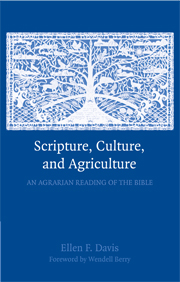Book contents
- Frontmatter
- Contents
- Foreword by Wendell Berry
- Acknowledgments
- Abbreviations
- Introduction
- 1 Rupture and Re-membering
- 2 Reading the Bible Through Agrarian Eyes
- 3 Seeing with God: Israel's Poem of Creation
- 4 Leaving Egypt Behind: Embracing the Wilderness Economy
- 5 A Wholesome Materiality: Reading Leviticus
- 6 Covenantal Economics: The Biblical Case for a Local Economy
- 7 Running on Poetry: The Agrarian Prophets
- 8 Wisdom or Sloth? The Character of Work
- 9 The Faithful City
- Postscript
- Notes
- Scripture Index
- Index
8 - Wisdom or Sloth? The Character of Work
Published online by Cambridge University Press: 05 June 2012
- Frontmatter
- Contents
- Foreword by Wendell Berry
- Acknowledgments
- Abbreviations
- Introduction
- 1 Rupture and Re-membering
- 2 Reading the Bible Through Agrarian Eyes
- 3 Seeing with God: Israel's Poem of Creation
- 4 Leaving Egypt Behind: Embracing the Wilderness Economy
- 5 A Wholesome Materiality: Reading Leviticus
- 6 Covenantal Economics: The Biblical Case for a Local Economy
- 7 Running on Poetry: The Agrarian Prophets
- 8 Wisdom or Sloth? The Character of Work
- 9 The Faithful City
- Postscript
- Notes
- Scripture Index
- Index
Summary
There is the bad work of pride. There is also the bad work of despair – done poorly out of the failure of hope or vision. … Good work finds the way between pride and despair.
(Wendell Berry)A WASTING DISEASE
There is no serious question that the chief effective causes of land degradation worldwide, and of the ecological crisis in general, are human work and population growth. Those two are directly connected, and the connection lies in the area of agriculture. Population growth as we have experienced it since the mid-twentieth century is largely a result of the vast increases in crop yields made possible by the invention of the process for fixing nitrogen in ammonia fertilizer compounds. In turn, a population of six and a half billion (and growing) has led to the large-scale conversion of previously untilled land to agricultural use; that conversion currently constitutes the greatest threat (even above global warming) to healthy ecosystems worldwide. It is apt, therefore, that contemporary agrarian writers give considerable attention to the character and quality of work and to the attitudes, healthy and unhealthy, that underlie it.
U.S. Poet Laureate Donald Hall writes of his grandparents and their farming community in New Hampshire:
The farm produced little money, and my grandfather wore my father's old hand-me-downs; everywhere rags of poverty flourished like skunkweed. Still, my grandparents appeared to enjoy their work, which did not extend human consciousness but occupied or absorbed it. […]
- Type
- Chapter
- Information
- Scripture, Culture, and AgricultureAn Agrarian Reading of the Bible, pp. 139 - 154Publisher: Cambridge University PressPrint publication year: 2008



